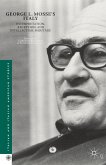This book argues that contemporary Italian history has been marked by a tendency towards divided memory. Events have been interpreted in contrasting ways, and the facts themselves often contested. Moreover, with so little agreement over what happened, and why it happened, it has been extremely difficult to create any consensus around memory. These divisions have been seen at all levels, but take on particular importance when linked to the great traumatic and life-changing events of the Twentieth century - war, terrorism, disaster - but can also be applied to more cultural fields such as sport and everyday life. Social change also has an impact on memory. This book will take the form of a voyage through Italy (and into Italy's past), looking at stories of divided memory over various periods in the twentieth century. These stories will be interwoven with analysis and discussion.
Bitte wählen Sie Ihr Anliegen aus.
Rechnungen
Retourenschein anfordern
Bestellstatus
Storno









